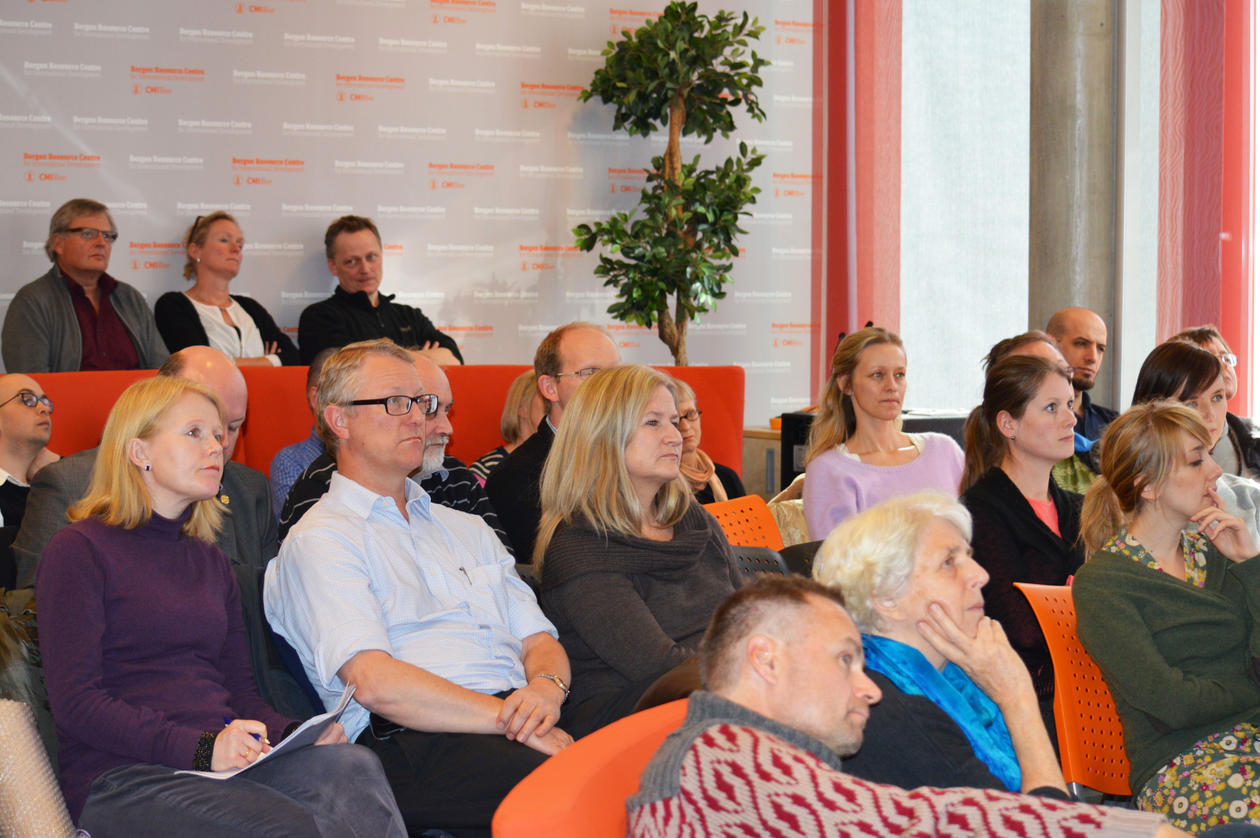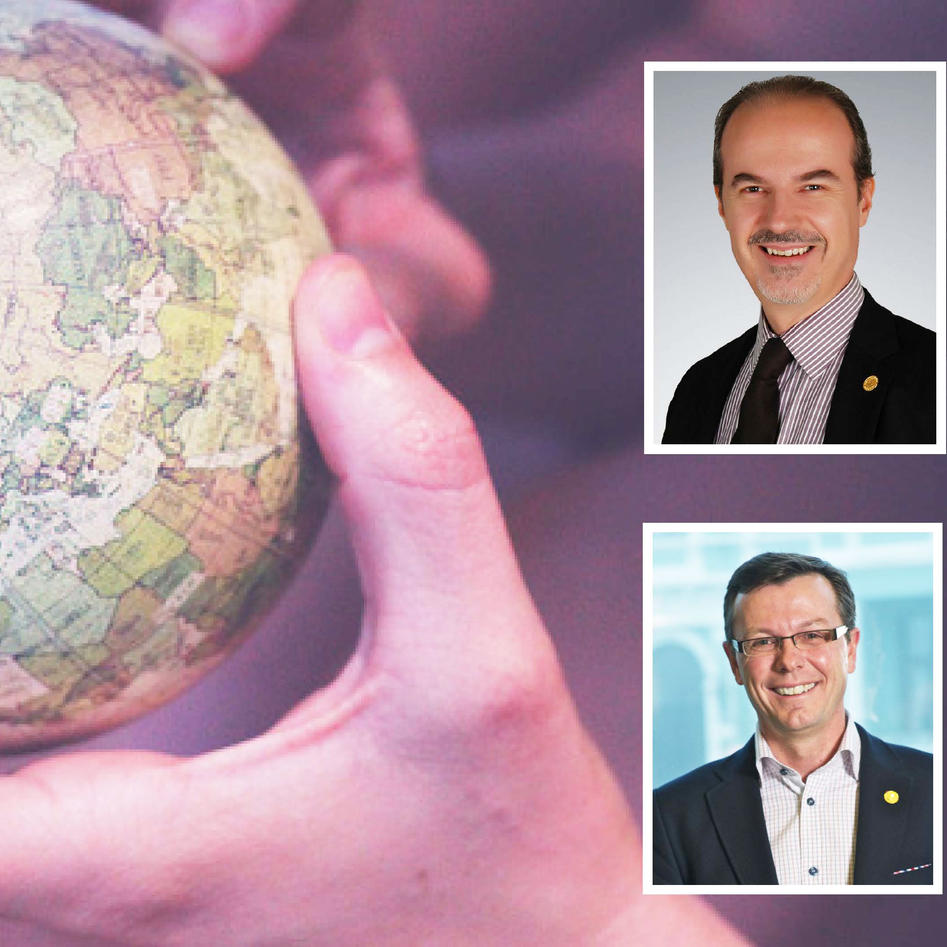Different visions for global and development-related research
At a debate on 19th March both rectoral candidate teams committed to securing and strengthening global and development-related research at UiB.

Main content
Tuesday 19th March candidates Dag Rune Olsen and Kuvvet Atakan came to the Bergen Resource Centre for International Development, together with their running mates. The event was organised by UiB Global and the university’s strategic council for global and development-related research, and was hosted by the council’s leader Gro Th. Lie.
The topic of debate was global and development-related research, one of the university's two priority areas. Staff and students from all corners of the university came to listen to and participate in the debate, along with representatives from CMI and the Resource Centre. This interest reflected the importance of the research field at UiB and in Bergen’s broader research environment.
Debating solutions for research across disciplines
Both teams supported the need to secure and strengthen the breadth of global and development-related research at UiB. In addition there was agreement that meeting global challenges depends on a vision for the initiation and organisation of multi-disciplinary research which can answer the big questions about poverty, development, health and sustainability. A large part of the debate therefore centred on the institutional structures and financial solutions needed to meet these challenges.
Anne Christine Johannessen is team Olsen’s candidate for Vice-Rector for international relations. In her opening remarks she emphasised the imperative for student and researcher mobility between UiB and partner institutions in the global south, as well as the need to maintain a high number of foreign PhD student, including quota students:
– The quota students return to their countries of origin, where they remain good contacts for future collaboration, said Johannessen.
Building on UiB Global’s current activities
The Vice-Rector candidate further underlined the centrality of UiB Global in the university’s future efforts in the field. She alluded to UiB Global’s turbulent period of transition in 2010, when Uni Global was brought back to UiB from Uni Research. This institutional change led to the relocation of a number of researchers back to their respective departments, and to an administrative transition of the unit itself, which was made part of the Department of Research Management.
– UiB Global has gone through a turbulent period, but there are also success stories such as the Nile Basin Research Programme, the Comparative Research Programme on Poverty, and the Bergen Summer Research School, which remain at UiB Global. We need to establish ties between UiB Global and the research milieus, so that this becomes an oasis of collaboration, said Johannssen.
Team Olsen’s Candidate for Vice-Rector for education, Oddrun Samdal, followed up on Johannessen’s remarks. She confirmed that global and development-related research would be centred at the faculties, while underlining the need to strengthen the role of UiB Global:
– Multidisciplinary initiatives in development research depend on good basic research environments, but we also need good meeting places. UiB Global will represent this, by being a physical arena for research and education across faculties. This can be done by organising seminar and lecture series, by welcoming guest researchers and PhD students at the facilities, and by organising research schools between faculties, said Samdal, who also emphasised the need to secure future scholarships for students from the global south who wish to attend the Bergen Summer Research School.
Dag Rune Olsen concluded his team’s presentation by proposing structural changes which he said would reinforce the role of UiB Global. In their plan the university budget will include a budget item at the disposal of UiB Global’s leader, who will also have responsibility for the unit’s human resources and be part of the rector’s group of leaders.
Establishing a centre for global and development-related research
Candidate for Pro-Rector Vigdis Broch-Due gave the introductory speech on behalf of team Atakan. She too called attention to UiB Global’s transition in 2010:
– It has been a turbulent process, and the frustration is clearly expressed in debates, such as in På Høyden. Today UiB Global is part of the Department of Research Management, and that is clearly not a good solution in the long run, said Broch-Due, who launched team Atakan’s plan for restructuring:
– We need groundbreaking inquiry in addition to all the multidisciplinary research already going on. This fresh theoretical focus should be placed at the intersection between the humanities, the social sciences and law, and must attract young talents. We need more knowledge about the long lines of globalization from the past into the future. We must understand better its many transformations and configurations, economically, politically, socially and culturally. The success of the original Centre for Development Studies under Gunnar Sørbø’s visionary leadership in 1980s was exactly due to its role in promoting innovative research, said Broch-Due.
– Therefore UiB Global needs to be taken out of the Department of Research Management and brought into UiB’s organisation on the academic side. We need UiB Global to be more than a meeting point and a coordinating organ. It needs also to be a place of work for researchers and students, said Broch-Due, emphasising that UiB Global should house a specialised administration with the competence of dealing with institutions and conditions in the South. A proper organisational placing would help to increase cooperation with CMI, and revitalize The Bergen International Summer School, she said.
She also warned that “the devil is in the details”, and argued in favour of adjusting the decentralisation model of research funds to faculties and departments, in order to create incentives for collaboration across disciplines and faculties. Close to her concern was the need to find a good solution to the unique library built at the CMI.
The candidate for Pro-Rector stressed that team Atakan’s plans were preliminary:
– Last time around those who were affected by the changes were not heard. Team Atakan promise to be more attentive and to secure their participation in the decision making, said Broch-Due.
Disagreement over the organisation of the field
During the discussion both teams were asked to further clarify their positions, and proceeded to challenge the wisdom of each other’s proposals. Dag Rune Olsen suggested it would be unwise to limit participation in UiB Global to three faculties:
– We want the participation of all fields, not only the humanities, social sciences and law. We haven’t suggested any reorganising of UiB Global. We wish to build on the excellent work that has been done, and support it.
To which Vigdis Broch-Due replied that Olsen had misunderstood:
– We’re going through all fields, to see how they collaborate across all faculties. We need a new element in addition to all the current research across the natural sciences, medicine, and social sciences. We need to strengthen the contribution from the humanities, law and social sciences, we need to recruit the young talents who can bring fresh perspectives, and we need to organise UiB Global in the academic line, not the administrational line. We’re absolutely not trying to exclude the other faculties. UiB Global should retain its multidisciplinary coordination, said Broch-Due.
Kuvvet Atakan followed up on the plans for an organisational structure, and emphasised that the location of the centre was a practical matter, saying the main point was to do what is necessary to ensure a reinforcement and renewal of the field.
Oddrun Samdal reiterated team Olsen’s position by arguing against making UiB Global a research centre:
– We will give the UiB Global model a chance. We wish to evaluate the current structure continuously. The moment you establish a centre, the activities are naturally limited by the people who work there, said Samdal.
Kuvvet Atakan pointed to 20 years of insufficient organisational forms as the reason for the need to restructure:
– We need to have new ideas based on experience. If we are serious about one of the main areas of research we have to give it an organisational structure, said Atakan, who drew criticism from Olsen for distancing himself from the policies of a rectorate that he himself has been a part of for the last four years.
A commitment to fund the research
Regardless of institutional arrangements involving UiB Global, both teams recognised the need to restructure UiB’s internal financing in order to live up to the university’s decision to make global and development-related research a prioritised field.
– Much of the research knowledge we have obtained reflects the programmes in the Research Council of Norway and the EU, which focus on fashionable topics, so to speak. The Research Council and other foundations don’t always wish to invest in theory building. Therefore we need to invest our own resources in basic research, and to let our young talented scholars from several disciplines revitalise and spearhead the globalization research, said Broch-Due.
Dag Rune Olsen agreed that the university needs to invest its own funds in global and development-related research, and pointed to the EU’s Horizon 2020 as a promising possibility for external research funds in the future.
Significant structural obstacles to central funding
However, as the allocation of research funds is mainly the prerogative of the faculties, the candidates were asked how the rectorate would be able to make such budgetary priorities.
Kuvvet Atakan answered that there will have to be collaboration with the faculties:
– We need to be realistic with regard to what we can do. We have a scope of action within these limitations. The departments too have more budgetary control. So if we want a centrally planned strategy we need to prioritise. That’s why we need to have an understanding of these priorities at the faculty level, said Atakan.
Dag Rune Olsen stressed the need to allocate funds between faculties:
– First and foremost we need meeting places. That’s why UiB Global and the Resource Centre are very important. The Faculty of Natural Sciences and the Faculty of Social Sciences have already granted joint PhD scholarships. We will build on this with a dedicated budget, and UiB Global’s academic leader will be part of rector’s group of leaders and will be responsible for allocating these resources to be used on activities which cut across faculties, said Olsen.
Both teams repeatedly stated their commitment to addressing global challenges, as part of UiB’s societal responsibilities. Although their propositions differed, they both underlined the need for a stronger coordination between the faculties through UiB Global, which also has the prospect of housing a research school, PhD students and researchers from different disciplines.
This promises a brighter future for the field, regardless of who wins in April.

